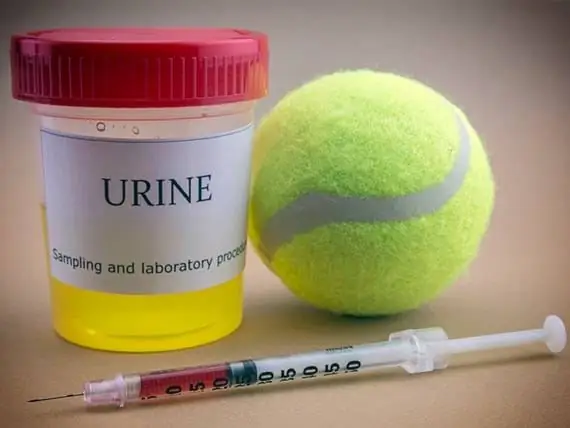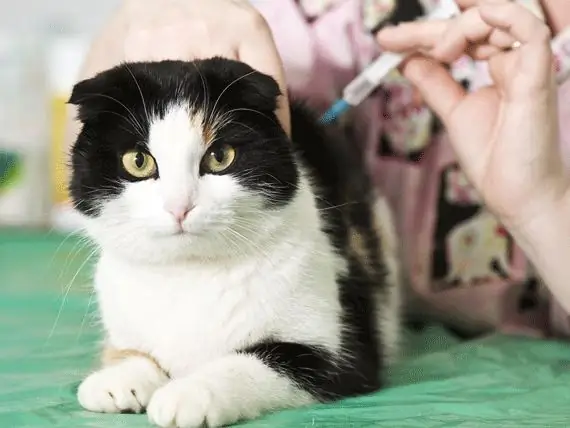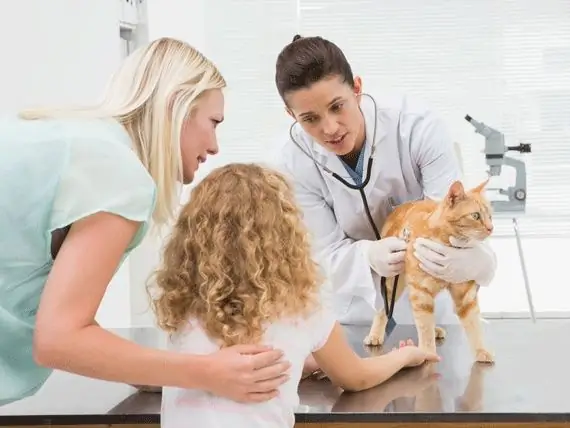
- Autore Daisy Haig haig@petsoundness.com.
- Public 2023-12-17 03:10.
- Ultima modifica 2025-06-01 06:47.
Quindi a cosa serve quell'imbarazzante test caca, comunque?
È abbastanza stressante avere il didietro del tuo animale domestico violato da una bacchetta di plastica, giusto? Allora qual è il punto?
Dici: se l'obiettivo è rendere il mio animale domestico più sano e privo di parassiti, allora mi fiderò del tuo giudizio, ma devo dire che i controlli delle feci sono una sorta di punizione crudele e insolita. Non ricevo quel tipo di umiliazione fino a quando non ho quarant'anni, giusto? E le feci non sono così utili, giusto?
Dico: per cominciare, non è necessario che il tuo animale domestico soccomba alla verga vile. Un campione fresco di solito si ottiene facilmente la mattina (o il pomeriggio) prima della visita annuale o ogni volta che il tuo animale domestico soffre di sintomi gastrointestinali. Non è così difficile, davvero. E se il momento non è esattamente quello giusto (le feci non dovrebbero essere più vecchie di un'ora per ottenere i migliori risultati), il tuo ospedale veterinario non ti negherà sicuramente il diritto di portare un campione super fresco a tuo piacimento. Promettere.
E sì, gli esami fecali, sebbene relativamente economici e di routine, sono indispensabili. Ma come dimostrerà questo post, è anche vero che non tutti i test fecali rilevano un'infezione parassitaria nei tuoi animali domestici. Ecco perché potrebbero essere necessari esami fecali annuali e/o seriali.
Ora per l'obiettivo principale del test:
I veterinari sono sempre alla ricerca di parassiti che possono penetrare nel tratto gastrointestinale dei tuoi animali domestici. Certo, anche noi umani possiamo contrarre i parassiti, ma i nostri stili di vita moderni tendono ad essere meno favorevoli all'infezione da parassiti. (Quando è stata l'ultima volta che sei andato ad annusare nel cortile, con le labbra a terra, solo per poter inalare uno o due stronzi felini?)
Sì, gli animali domestici prendono molti parassiti. Ecco un esempio dei parassiti gastrointestinali più comuni che vedo qui [nel paradiso dei parassiti che è semi-tropicale nel sud della Florida]:
Ascaridi in cani e gatti.
Anchilostomi negli animali domestici
Tricocefali negli animali domestici
Giardia negli animali domestici

Dirmita epatica negli animali domestici
Dirmita epatica negli animali domestici
coccidia in pets
i’ll not go into the gory details on each but you can click on the links and check out the info for a better understanding of how these parasites can potentially affect your pets and even your human family.
sure, pet-popular parasites don’t often infect humans in the so-called, “developed” nations all of you reading this likely live in, but that doesn’t mean it doesn’t happen. roundworms and hookworms are still a factor in humans in the us, as is giardia, which will give you the nastiest case of diarrhea you can imagine short of amoebic dysentery.
since veterinarians are also on the front lines when it comes to public health, consider that fecal exams are not just necessary for healthy pets, they’re essential for healthy humans, too, more so if your family members are very young children, very old adults or otherwise immunocompromised (transplant patients, hiv-positive humans, chemo recipients, etc.).
how do we identify these critters in the fecal exam?
the short answer: with a microscope.
the long answer: we take a tiny sample of your pet’s stool (very fresh is always best). a few grams is enough (think an eighth of a teaspoon if that’s easier). then we put it through one of three processes.
1. the smear: we take about a half gram of stool and smear it onto a microscope slide to search for parasites (and bacteria) directly. many times we’ll see them swimming about. finding evidence of parasites in a simple smear is often indicative of severe infection.
2. the float: this method relies on mixing the stool with a special solution. it filters out the big pieces of stool in a tube or other cylindrical vessel and allows the eggs and other small critters to float up to the top, buoyed by the solution’s specific gravity. a microscope slide’s cover slip is typically used to recover the floaters. some parasites, however, aren’t amenable to flotation. eggs seem to do best through this method.
3. centrifugation: spinning the heck out of stool in a centrifuge when it’s mixed in a sugar solution picks up about 50% more parasite eggs and oocysts than through flotation. therefore, i like this method best for worm eggs, giardia, and coccidia--though i’d never go without a smear. problem is, most hospitals don’t yet use this method. it’s more expensive than others and research demonstrating it’s much greater efficacy is fairly recent.
so now you know the truth: not all fecal exams are created equal. not only does this test rely on careful selection of materials and methods, it also requires a trained eye. in our practice, for example, one of our techs detects parasites about 50% more often than the veterinarians and other techs/assistants. (that’s why we also do floats so that she can check them all at her convenience when she comes back from her day off.)
it’s also true that even a parasite-infected animal will often not come up positive on a fecal test. human error and equipment choice are factors, but so is the parasite itself. sometimes they do not make themselves known in the stool. worms sometimes aren’t shedding their eggs and subclinical (low-grade or smoldering) infections may not reveal much, either.
again, that’s why it’s important to perform this test as often as is reasonable. for all dogs and cats at least three times during the first few months of life. i want to see at least two negative tests in a row, a month apart, before i’ll feel comfortable that my patient is parasite-free.
for adults, once a year is great--that is, unless they show gastrointestinal illnesses. in this case, serial fecal tests make sense--or at least one every time the symptoms recur until a definitive diagnosis is made (whether it’s parasites or something else).
ultimately, fecal tests are a critical component of our veterinary hat of tricks. doing without may seem like the economically wisest thing in the absence of gastrointestinal symptoms, but consider: parasites can wear pets down in ways you might not expect. and it’s never wrong to be too safe in the presence of diseases that may also affect your family. ‘nuff said.
Consigliato:
Vaccini Sullo Stile Di Vita: Cosa Sono E Di Cosa Ha Bisogno Il Tuo Animale Domestico?

I vaccini non sostituiscono la vigilanza, ma sono una parte importante dell'assistenza sanitaria del tuo animale domestico. Scopri quali sono le vaccinazioni sullo stile di vita e di quali potrebbe aver bisogno il tuo animale domestico
L'importanza Della Stadiazione Per Animali Con Cancro, Parte 3 - Test Delle Urine E Delle Feci Per Animali Con Cancro

Parte del processo di stadiazione del cancro per gli animali domestici in trattamento consiste nel testare tutti i diversi fluidi del corpo. In questa puntata, il Dr. Mahaney spiega il processo di analisi delle urine e delle feci. Leggi di più
Cosa Dice Il Sangue Al Tuo Veterinario Sulla Salute Del Tuo Animale Domestico

Le analisi del sangue vengono eseguite per garantire che siamo sani all'interno come sembriamo all'esterno o per monitorare le condizioni mediche precedentemente diagnosticate. Lo stesso vale per gli animali da compagnia. Scopri di più su ciò che le analisi del sangue possono dire al tuo veterinario
Cosa Devi Chiedere Al Tuo Veterinario Sul Cancro Del Tuo Animale Domestico

I proprietari fanno una quantità enorme di domande sul cancro dei loro animali domestici. Alcuni sono prevedibili e alcuni sono più specifici, mentre altri possono essere notevolmente indagatori. Scopri di più su cosa dovresti chiedere al tuo veterinario
Come Sapere Se Il Tuo Animale Domestico Ha Bisogno Di Un'autopsia (e Che Cos'è Comunque Un'autopsia?)

Necroscopia, autopsia animale, animali domestici, cane, gatto
